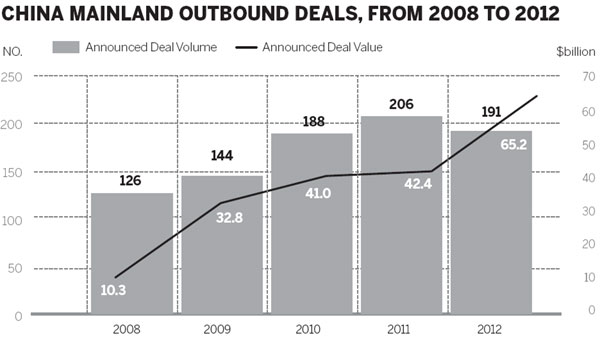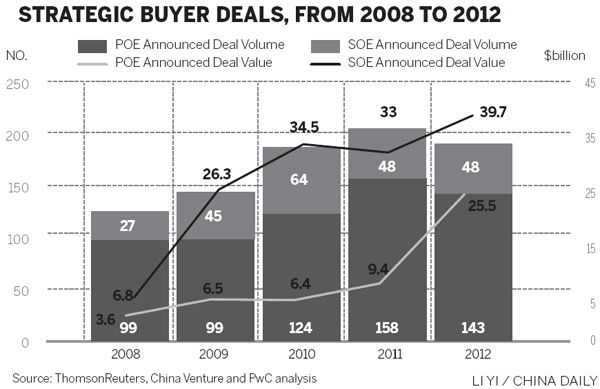Outbound M&A activity mounts up
Updated: 2013-03-11 09:18
By Cai Xiao (China Daily)
|
|||||||||||


Qian added that an M&A deal in the overseas market may fail because of various reasons including a stakeholder's opposition or government's disapproval.
Marchick insisted the US is open to Chinese investment. He told China Daily that many controversial cases involving Chinese acquisitions are in the energy sector but most other investments go through without a problem.
"There has been a trend of investment in the United States in automotive parts and the transportation and real estate sectors," said Marchick, adding that Chinese companies are also very free to invest in retail and agriculture.
Ashworth said there is interest across a wide range of sectors, including natural resources, traditional and renewable energy sources, utilities, financial institutions and technology.
"We anticipate the healthcare and chemical sectors will be particularly active in 2013," said Ashworth.
"Deals in the manufacturing sector will be very popular in 2013," said Qian, adding that in addition to resources, Chinese companies have long held a strong demand for manufacturing technology and patents. As they get more experienced at conducting such deals, activity in the sector will pick up.
M&A deals by Chinese companies linked to their own industry sector will also become increasingly popular in 2013, according to a report by ChinaVenture Group, a private equity and venture capital research agency.
Because private companies require funds to go abroad for M&A deals and face some obstacles when they try to get loans from banks, venture capital and private equity firms will play a more important role in helping these companies - as well as State-owned ones - over the next few years, said the ChinaVenture report.
"The ultimate success of any transaction depends on strong planning and execution but also integration and communication after the deal closes," said Ashworth.
He added that while every deal is different, it is necessary for Chinese companies to take the time to plan how the deal will work after it is closed. It is important for them to think about the important intellectual property issues, build the right organizational structure, incentivize the management team and consider how the operational functions will work.
caixiao@chinadaily.com.cn
Related Stories
Year-ender: outbound M&As 2013-01-28 17:26
Outbound M&A activity on the rise, survey says 2013-01-08 13:05
China's outbound M&As on the rise 2012-12-27 15:13
Outbound M&As on the rise, says report 2012-12-27 09:56
China's outbound direct investment set to rise 2012-12-15 09:14
Outbound travel on the rise 2012-11-30 16:01
Today's Top News
Police continue manhunt for 2nd bombing suspect
H7N9 flu transmission studied
8% growth predicted for Q2
Nuke reactor gets foreign contract
First couple on Time's list of most influential
'Green' awareness levels drop in Beijing
Palace Museum spruces up
Trading channels 'need to broaden'
Hot Topics
Lunar probe , China growth forecasts, Emission rules get tougher, China seen through 'colored lens', International board,
Editor's Picks

|

|

|

|

|

|





